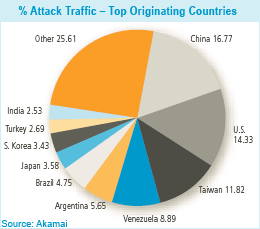
Eric Vyncke reporting in the NetworkWorld: "IPv6 exists for more than 15 years and it is rumored to be deployed extensively in Asia and especially in Japan and China with Africa being the last continent to deploy IPv6. Another place where there should be a lot of deployments is of course in the USA with the US Government IPv6 mandates. But, when it comes to measure where web sites are actually deployed over IPv6, the rumor proves to be just a myth..." more
The UK government has released the results of national cybersecurity survey revealing nearly seven in ten large companies in the country have identified a breach or attack in the past 12 months. more
Earlier this morning, the national fiber backbone of Iraq was taken offline in an effort to combat cheating on 6th grade placement exams. more
According to a new report by the Danish government's Center for Cybersecurity, hackers have breached email accounts and servers at both the Defense Ministry and the Foreign Ministry in 2015 and 2016. more
Amy Smorodin writes: The Technology Policy Institute and the Centre for European Policy Studies are co-hosting "Internet Governance and ICANN: Emerging Policy Issues," scheduled for June 18th at CEPS in Brussels. The conference will feature discussion on issues stemming from ICANN's newly established operating structure under the Affirmation of Commitments. more
In a press release yesterday evening, retailer Eddie Bauer confirmed a point-of-sale malware infection suspected by some sources as early as beginning of last month. more
On Friday, May 2, 2014, representatives of the companies Kickstarter, Meetup, and Tumblr, along with representatives of the New York City Tech Meetup and Engine Advocacy, met with FCC staff to express their strong opposition to the FCC Chairman's draft proposal concerning network neutrality... "While the Chairman's proposal may look good on paper, it provides no certainty or effective remedy for smaller entrepreneurs building real businesses on the internet." more
United States Justice Department has announced that US and China have reached an agreement governing how the two countries will request assistance to combat cybercrime. more
James Cowie from Renesys reports: "8.9 magnitude earthquake in Japan has had surprisingly limited impacts on the structure and routing dynamics of the regional Internet. Of roughly 6,000 Japanese network prefixes in the global routing table, only about 100 were temporarily withdrawn from service -- and that number has actually decreased in the hours since the event. Other carriers around the region have reported congestion and drops in traffic due to follow-on effects of the quake, but most websites are up and operational, and the Internet is available to support critical communications." more
 The Biden administration has issued a stark warning to the nation's governors about the increasing threat of cyberattacks on the United States' water and wastewater systems. more
The Biden administration has issued a stark warning to the nation's governors about the increasing threat of cyberattacks on the United States' water and wastewater systems. more
 A recent quarterly report titled "State of the Internet" has been released by Akamai providing Internet statistics on the origin of Internet attack traffic, network outages and broadband connectivity levels around the world. According to the report, during the first quarter of 2008, attack traffic originated from 125 unique countries around the world. China and the United States were the two largest traffic sources, accounting for some 30% of traffic in total. The top 10 countries were the source of approximately three quarters (75%) of the attacks measured. Other observations include... more
A recent quarterly report titled "State of the Internet" has been released by Akamai providing Internet statistics on the origin of Internet attack traffic, network outages and broadband connectivity levels around the world. According to the report, during the first quarter of 2008, attack traffic originated from 125 unique countries around the world. China and the United States were the two largest traffic sources, accounting for some 30% of traffic in total. The top 10 countries were the source of approximately three quarters (75%) of the attacks measured. Other observations include... more
Dozens of U.S. government websites have become insecure or inaccessible during the ongoing U.S. federal shutdown. more
According to reports today, the Australian federal government made a drastic change to a bill that could potentially allow ISPs to police online traffic. Karen Dearne of the Australian IT reports: "Electronic Frontiers Australia spokesman Geordie Guy said it was unclear if the draft Telecommunications (Interception and Access) Amendment Bill was an "attempt to sneak through" a wholesale expansion of intercepts of private emails and file-sharing or merely a badly drafted bill." more
 The Internet Society today announced that it has been awarded a grant by Google.org to extend its Internet exchange point (IXP) activities in emerging markets. The grant will build on the Internet Society's previous efforts and will establish a methodology to assess IXPs, provide training for people to operate the IXPs, and build a more robust local Internet infrastructure in emerging markets. more
The Internet Society today announced that it has been awarded a grant by Google.org to extend its Internet exchange point (IXP) activities in emerging markets. The grant will build on the Internet Society's previous efforts and will establish a methodology to assess IXPs, provide training for people to operate the IXPs, and build a more robust local Internet infrastructure in emerging markets. more
Nancy Scola reporting in the Washington Post: "The latest battle over who should run the Internet will be waged in the South Korean port city of Busan over the next three weeks. For U.S. officials headed to the United Nation's International Telecommunication Union's Plenipotentiary Conference, the goal is simple: prevent a vote. In short, the State Department's approach is this: Convince the representatives of the other 192 member countries attending the conference that the 150-year-old U.N. technical body is the wrong forum for existential questions about how the Internet should work." more
Sponsored byRadix

Sponsored byIPv4.Global

Sponsored byWhoisXML API

Sponsored byCSC

Sponsored byVerisign

Sponsored byVerisign

Sponsored byDNIB.com
